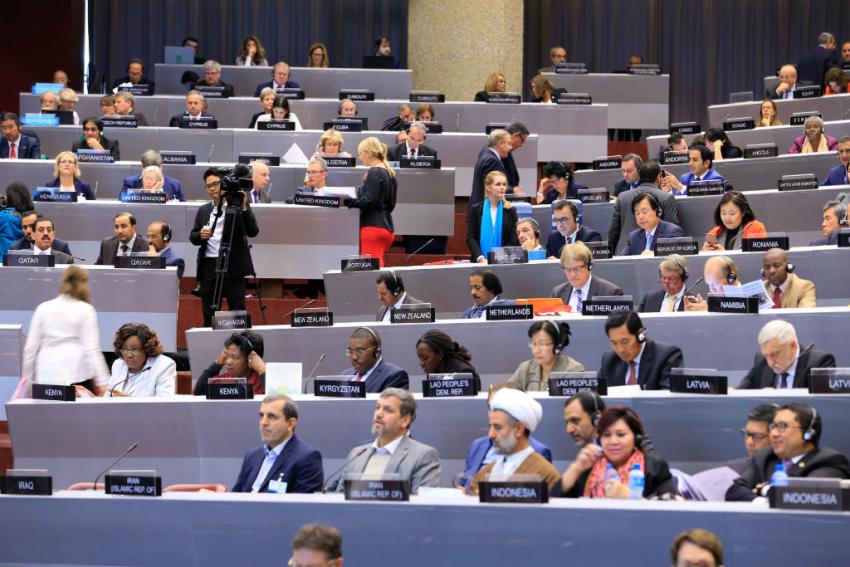By Schoni Song
On Sunday evening, the Inter-Parliamentary Union (IPU) passed a resolution in support of Palestinian rights at its 138th session in Geneva, Switzerland. According to reports, the IPU voted in favor of a resolution by Palestine, Kuwait and Bahrain, condemning US President Donald Trump’s statement made in December of last year in which he unilaterally bypassed all peace agreements and negotiations. Trump declared that Jerusalem was Israel’s rightful capital and thereby denying all Palestinian claims to one of the most politically-charged cities in the Middle East.
The Jordanian representative was also reportedly involved in lobbying for the motion. The IPU is a forum made up of representatives from the national legislatures of 176 countries. At their annual session in Geneva this week, four resolutions were considered in total with respective to the issue of Palestine and Israel—three of which were put forward by the Palestinian Authority and the remaining resolution proposed by the Israeli delegation. A resolution introduced by Israel, meanwhile, condemning “Iran’s malign activities,” did not pass.
During the sessions, Palestinian representative Azam al-Ahmed waved a photo of Ahed Tamimi, the 17-year-old Palestinian sentenced to eight months in prison for allegedly assaulting Israeli Defense Force (IDF) personnel stationed outside her home. The Palestinian delegation also distributed brochures calling for “Freedom for Ahed Tamimi. Freedom for Palestine.” To add to this, the Iranian delegation denounced the “crimes of the Israeli occupation” and claimed that the US decision would stir up further violence in the region.

The 138th Inter-Parliamentary Union assembly convenes in Geneva, Switzerland. (Photo: IPU)
The Israeli representatives responded with a resolution calling Iran a “terrorist state.” An Israeli media also said that the Palestinian delegation’s success at the IPU came “despite Israeli efforts” with Members of Knesset “work[ing] all weekend” and “meeting with representatives from Argentina, France, Russia, Mexico, Canada, Brazil and other countries.” However, the Jerusalem Post noted that at the end of the day, “the Palestinian effort succeeded and the Israeli initiative was voted down.”
Later, Israeli Prime Minister Benjamin Netanyahu issued an official statement strongly denouncing the resolutions passed at the 138th session of the inter-parliamentary conference, claiming on that the council was adopting “resolutions that have lost touch with reality.” PM Netanyahu also added that it was high time that the name of the Human Rights Council be changed to “the council that adopts resolutions against the only democracy in the Middle East.” To add to this, the Israeli Defense Minister Avigdor Lieberman called on Israel to withdraw from the council, adding that Israel’s membership with the council granted it “recognition” thus far and was beginning to “harm the Jews.”
The Israeli media all reported that the IPU assembly in Geneva had passed an “anti-Israel” and “anti-US” resolution despite their efforts. They also criticized the Palestinian Authority’s proposal of three emergency items—in partnership with their Middle Eastern neighbors Bahrain and Kuwait—to condemn Israel and the United States for the announcement that the US Embassy would relocate to Jerusalem, and also for the American decision to slash its funding to UNRWA, the United Nations agency for Palestinian refugees and their descendants.

The Sisyphean task of the Israeli-Palestinian conflict in the Middle East is considered to be one of the most enduring challenges of international politics and diplomacy of ours times. (Photo: Canva)
All in all, the Palestinian Authority seems to have exerted its best efforts to appear to be taking defiant steps in the wake of Trump’s announcements regarding Jerusalem. Last Tuesday, the Palestinian Authority also boycotted a White House conference about the humanitarian crisis in Gaza. The US Special Envoy to the peace process, Jason Greenbalt said, “This is not about politics. This is about health, safety and happiness of the people of Gaza and of all Palestinians, Israelis and Egyptians.” Regardless of Greenbalt says, the issue at hand is most definitely about politics.
While, the regurgitation of facts and political narratives—about the dire state of affairs in the Middle East and the lack of access to basic needs—continues across the world, the de facto humanitarian crisis looms larger than ever before. If neither side of the political aisle wishes to be seen as exploiting the enclave for a show of power, they would both have to step up their game—and fast.
The writer is a program officer in the National Assembly of the Republic of Korea. He can be reached at schoni0124@naver.com or mseap@assembly.go.kr. |